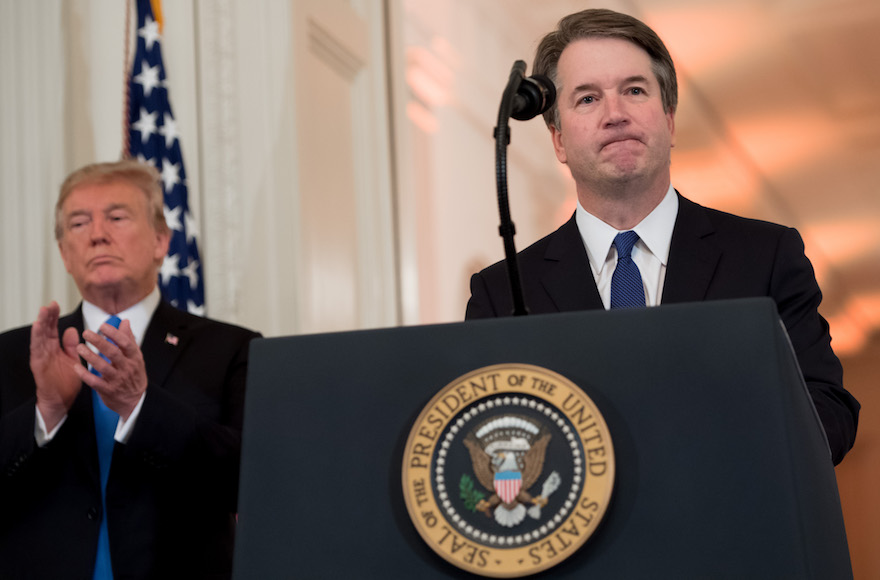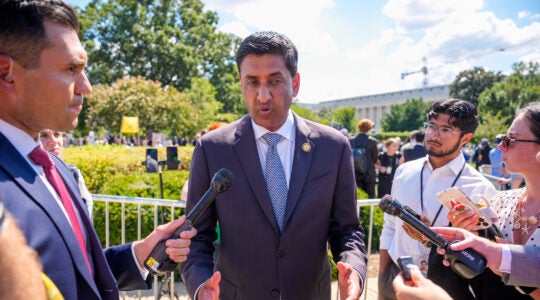(JTA) — President Donald Trump nominated Brett Kavanaugh, a federal appeals court judge in Washington, D.C., to replace Supreme Court Justice Anthony Kennedy upon his retirement at the end of July.
The pick, as expected, disappointed liberals concerned about reproductive rights and civil liberties but was welcomed by conservatives as an opportunity to reshape the court for perhaps decades.
Kavanaugh, 53, is well respected by the Republican establishment, although some on the right have said he is not conservative enough. Trump reportedly was wary of Kavanaugh’s close ties to George W. Bush, who nominated him to his current position in 2003.
“A judge must interpret the law and not make the law,” Kavanaugh said in remarks from the East Room of the White House on Monday night. “A judge must interpret statues as written, and a judge must interpret the Constitution as written, informed by history and tradition and precedent.”
He also thanked Associate Justice Elena Kagan, who hired him to teach a course on the Supreme Court when she was the dean of Harvard Law School.
Kavanaugh is a graduate of Yale Law School and he clerked for Kennedy on the Supreme Court. He helped draft the Starr Report, which called for President Bill Clinton to be impeached because he lied about having had a sexual relationship with Monica Lewinsky, a White House intern.
He fought on the legal team urging Florida not to have a recount in the 2000 presidential election between Bush and Al Gore, Clinton’s vice president. The Supreme Court decision not to do so led to Bush becoming the president. Kavanaugh served in the Bush administration, including as the president’s staff secretary. His wife, Ashley Estes, served as personal secretary to George W. Bush.
In 2015, Kavanaugh, a Roman Catholic, filed a dissent in a case involving religious employers and reproductive rights. The case said that religious employers did not have to provide contraceptives but had to file a form telling the government they were not doing so, but Kavanaugh argued that the requirement violated religious freedom. Kavanaugh has stated that he considers Roe v. Wade binding and would seek to uphold it, though he has ruled in some cases to place restrictions on abortion.
Liberal Jewish groups, such as the National Council of Jewish Women, were as expected disappointed with Trump’s pick, regretting what is expected to be the Supreme Court’s long-lasting shift to the right
“The president’s nomination of D.C. Circuit Court Judge Brett Kavanaugh will threaten women’s reproductive rights generally and Roe v. Wade in particular,” NCJW CEO Nancy K. Kaufman said in a statement. “Kavanaugh also dissented from rulings upholding the Affordable Care Act and claims that the Consumer Financial Protection Bureau is unconstitutional. He routinely decides for the powerful against the powerless when safety, equality, consumer rights, the environment and workers protections are at stake. Although Kavanaugh worked on the impeachment of President Clinton, he now maintains that ‘criminal investigations and prosecutions of the president’ should be deferred while a president is in office.”
The Workmen’s Circle, a progressive Jewish organization with roots in the labor movement, said Kavanaugh’s nomination represents the latest salvo in a “war against the working people of this country.”
“While the President’s selection of a conservative candidate is not a surprise, it exemplifies the direction of this administration to further divide, rather than unite, our county,” said Ann Toback, its executive director.
Like NCJW, the Jewish establishment tends to take progressive stances on domestic issues such as reproductive rights, LGBTQ rights, voting rights, gun control and separation of church and state. Though Kennedy was seen as a conservative justice, he was a swing vote on some issues and authored opinions legalizing same-sex marriage and keeping Roe v. Wade intact.
The centrist Anti-Defamation League was also wary of Trump’s nominee.
“We are concerned that Judge Kavanaugh’s judicial record does not reflect the demonstrated independence and commitment to fair treatment for all that is necessary to merit a seat on our nation’s highest court,” Jonathan Greenblatt, ADL’s CEO and national director, said in a statement. “Because he has written and spoken prolifically on many issues of deep concern, we believe his positions merit close scrutiny. These include his demonstrated
Orthodox groups are likely to welcome a court that protects public religious expression over strict separation, as it did in recent rulings confirming a baker’s right to refuse to bake a cake for a same-sex wedding.
Trump’s pick will need to be confirmed by the Senate and can expect opposition from Democratic lawmakers.
JTA has documented Jewish history in real-time for over a century. Keep our journalism strong by joining us in supporting independent, award-winning reporting.






